Apr 5, 2025 – 48th Day of 100-Day Dharma Talk, 1080 Bows Practice, Dharma Q&A with Gilbeot
Hello. Today is the 47th day of Venerable Pomnyun Sunim’s 100-Day Dharma Talk. In the morning, Sunim led the 1080 Bows Practice, and in the afternoon, he conducted a Dharma Q&A session organized by “Gilbeot,” a community of broadcasting, film, theater, and art professionals.
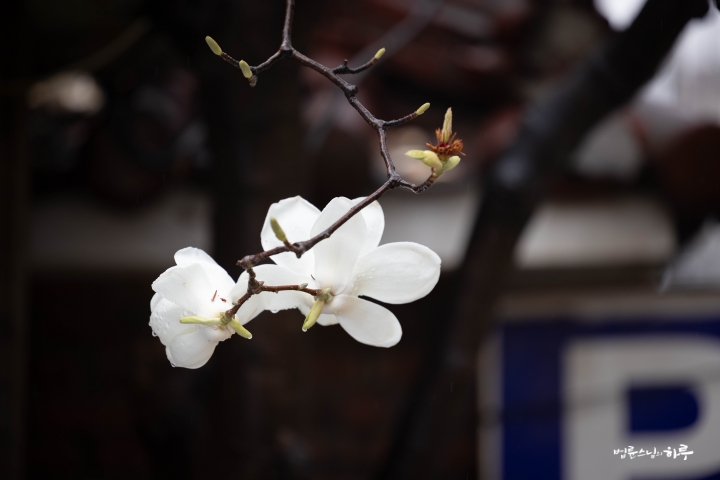
After completing his morning practice and meditation, Sunim headed to the Jungto Social and Cultural Center. On the third floor in the Dharma hall, many practitioners were participating in the 9 AM morning service, offering sincere prayers. After the service concluded, everyone briefly rearranged their seating.
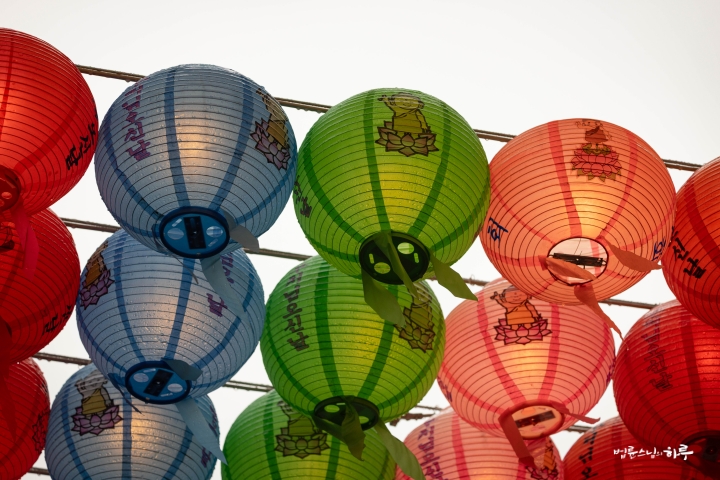
At 10:15 AM, after reciting the Three Refuges and the Heart Sutra, the practitioners performed three full bows to request Sunim’s Dharma teaching. About 150 people gathered for the practice session, somewhat fewer than when the practice first began. Sunim gave a Dharma talk about the proper mindset for practice.
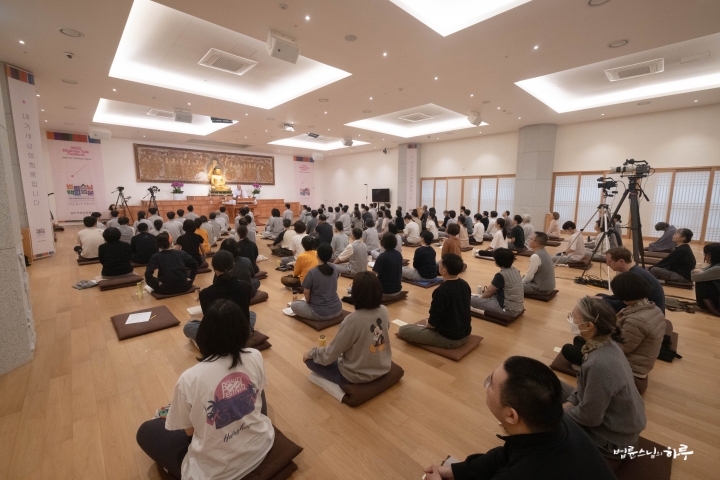
“This is our seventh 1080 Bows Practice session since we began. At first, there were so many participants that the space was quite crowded and not very comfortable for practice. But as the number of participants has gradually decreased, we now have just the right amount of space for a comfortable practice. (Laughter)
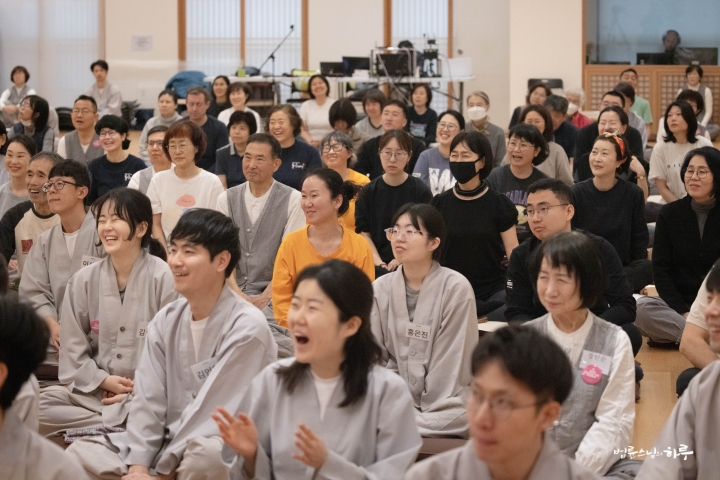
Practice can only truly be called ‘practice’ when it’s done consistently. If you’ve committed to a 100-day practice, you should continue without missing a day throughout those 100 days. This 1080 Bows intensive practice will be held fifteen times over 100 days, and it’s crucial to participate regularly every week without missing sessions. However, people’s enthusiasm often flares up briefly and then fades. They might practice two or three times, quit, start again, and quit again, making their practice irregular. Of course, practicing irregularly is better than not practicing at all. But when you practice, regularity is most important.
Benefits of Consistent Practice
Bowing practice isn’t the only form of intensive practice. Sitting in meditation for a week without sleep is also considered intensive practice. What are the benefits of such intensive practice?
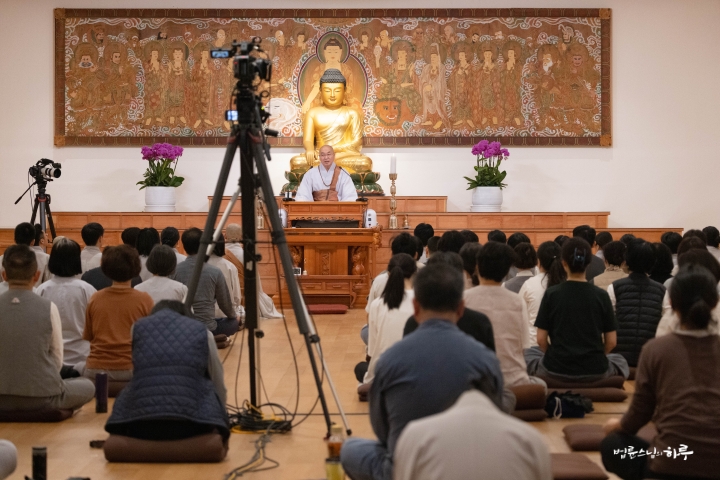
First, you gain self-confidence. Why does self-confidence develop? Because you experience a sense of achievement from overcoming difficulties. With self-confidence, you’re less likely to retreat or feel afraid when facing challenges because you’ve accumulated experiences of overcoming difficulties. When doing 1080 bows, around the 700th bow, you might desperately want to quit and go home. When doing 3000 bows daily, around the 2000th bow, you might feel like you can’t possibly continue. But when you overcome that feeling and continue, you develop trust in yourself. Conversely, if you repeatedly quit during practice, you lose faith in yourself. You start thinking, ‘I can’t do this,’ and develop a retreating mindset. However, if you persevere through difficult practice without giving up, you gain confidence and lose fear. This is the greatest benefit of practice.
Second, your physical health improves. Some people claim their knees were damaged from excessive bowing, but that’s not accurate. In reality, knees get injured when people bow too hastily out of impatience. As long as you don’t rush or overexert yourself due to time constraints, bowing is very beneficial for health. When I go on temple pilgrimages with practitioners to high mountains like Seoraksan or Odaesan, I can immediately distinguish between those who bow regularly and those who don’t. People who bow daily can climb mountains with relative ease despite some fatigue. But there are others who struggle even climbing Namsan in Gyeongju. When I ask them, ‘You don’t do 108 bows daily, do you?’ I’m always right. Unless you have a specific illness or leg injury, doing just 108 bows daily will enable you to climb mountains up to about 1000 meters without difficulty.
A healthy body leads to a clear mind. When your body constantly aches, you become controlled by your physical condition, and fear develops from worrying about pain. Physical discomfort creates a major obstacle to practice. Conversely, if you insist on only sitting meditation without bowing, you might actually harm your health. Sitting for long periods is worse for your knees than bowing and can also lead to hemorrhoids.
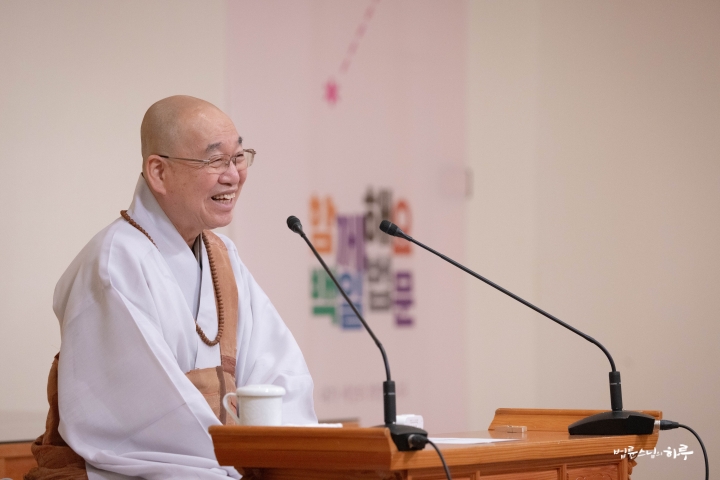
Third, prostrations develop concentration. When first doing prostrations, your body goes up and down while your mind wanders with all kinds of thoughts. As your body becomes more tired, even when defilements arise, your thoughts become more focused in one direction. You might focus on someone you dislike, but at least your mind isn’t scattered. (Laughter) When you become extremely tired, you become too exhausted to care about anything, forgetting even your feelings of hatred and just continuing with the prostrations. Normally, when a thought arises, you follow it, becoming angry or resentful, but when doing prostrations, the physical challenge makes it difficult to hold onto these defilements for long.
During meditation, emotions can sometimes overwhelm you to the point of explosion, but with prostrations, the physical exertion itself helps bring you back even when emotions pull you away. The practice of focusing on the breath (anapanasati) is used to calm a scattered mind. However, people with scattered minds often find it difficult to focus on breathing. For such individuals, prostrations are more beneficial than meditation. People with psychological instability, mental disorders, or depression benefit more from prostrations than meditation. Additionally, having strong lower body strength helps prevent mental illness. Those with weak lower bodies tend to have scattered minds. That’s why doing many prostrations is beneficial. The recommendation to walk frequently and engage in physical labor stems from the same reasoning. Of course, prostrations alone don’t lead directly to enlightenment. Prostrations can be viewed as building the foundational physical strength needed for practice.
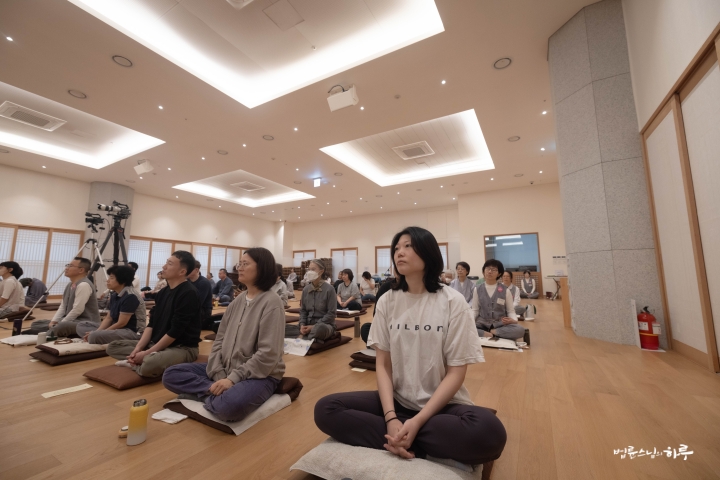
Fourth, prostrating frequently has the characteristic of deepening one’s faith. In Tibet, people perform full prostrations where they offer their entire body to the Buddha. Many people recite mantras and memorize entire long sutras. These practices strengthen faith, which is why Tibetans and Bhutanese have exceptionally deep devotion. While this may appear somewhat religious, we can observe that they are less focused on material wealth and place great importance on devotion and faith. Even setting aside the profound Buddhist teachings like emptiness of phenomena, impermanence, or non-self, their faith itself can be described as deeper.
Conversely, those who understand Buddhism only intellectually have the weakest faith. Their level of faith is even lower than those who practice Buddhism for material blessings. When religion faces persecution, intellectual religion is the first to disappear. Faith-based practices focused on blessings survive until the end, even if practiced in secret. In China, when communism arrived, most religions were dismantled, but esoteric Buddhism remained. People drew mantras throughout their homes and recited them anywhere, anytime, allowing these practices to become embedded in the culture. Whether this is a wise approach is a separate question, but preserving religion became synonymous with preserving their culture and traditions. This demonstrates that a certain level of faith is necessary to maintain consistent practice. Merely reading books and intellectual understanding is insufficient for sustained practice.
People often ask, “Did the Buddha perform 108 prostrations?” They question why Buddhism encourages prostrations when there are no records of the Buddha doing so. However, as Buddhism has been transmitted over many centuries, we’ve learned that physical strength and faith must form the foundation of diligent practice for the teachings to endure. Without these elements, people may start enthusiastically but soon give up. Performing many prostrations doesn’t bring blessings. However, frequent prostrations develop the strength to overcome any challenge. This can be described as the merit of diligent practice.
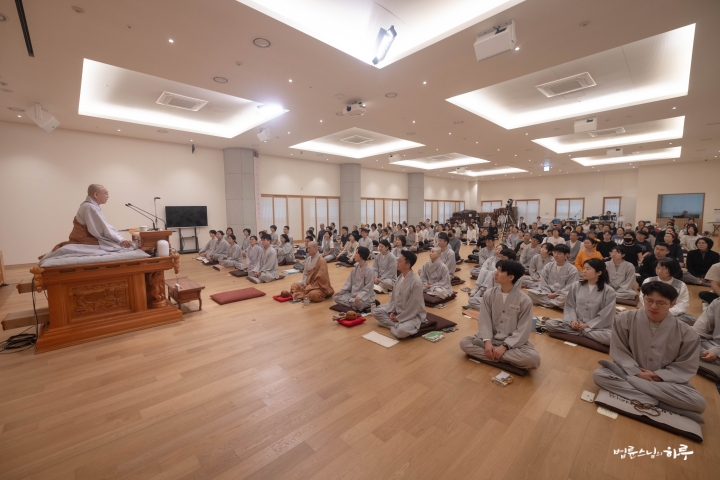
Of course, there are also disadvantages. Practitioners in countries like Thailand or Myanmar, where meditation is emphasized, tend to be calmer. They are less hasty and don’t rush. On the other hand, practitioners from cultures that emphasize prostrations gain strength but have less ease. Even when doing prostrations, they do so with greed, which doesn’t help correct their impatient temperament. Those who meditate move more slowly and show less anger or irritation because meditation values equanimity above all. However, when you actually live with them, they sometimes appear lazy due to their lack of energy. They also tend to lack drive and forcefulness.
The difference between Korean Buddhism and Theravada Buddhism stems from this. Korean Buddhism inherited the teachings of Seon (Zen), which has strength but also comes with a quick temper and anger. In this tradition, masters sometimes hit disciples who don’t practice properly. They even participated in wars. In Chinese Buddhism, martial arts like Shaolin Kung Fu are taught. However, these practices completely contradict the Buddha’s teachings. Of course, the Buddha himself gained tremendous strength through six years of ascetic practice, and the scriptures depict scenes of him fighting with Mara. Later, he realized the Middle Way and changed his approach. Nevertheless, because of those experiences, the Buddha was fearless—not only because he was enlightened but also because he had already survived several near-death experiences.
How to Develop Strength and Courage to Change Society
If you study too comfortably, everything you’ve learned disappears when difficulties arise. Knowledge gained from books vanishes the quickest. Proper practice comes from confronting those who oppose and criticize you. It’s like driving—you become a good driver only after experiencing cars cutting in front of you or making sudden stops. That’s why some eminent monks who practice quietly by themselves lack real-world experience. There’s merit in “not going where crows gather” and living quietly away from society, as it prevents harming others. However, this approach may leave one with insufficient strength to actively respond when social problems arise. This is the disadvantage of focusing solely on meditation—it can leave you lacking the power to solve social issues.
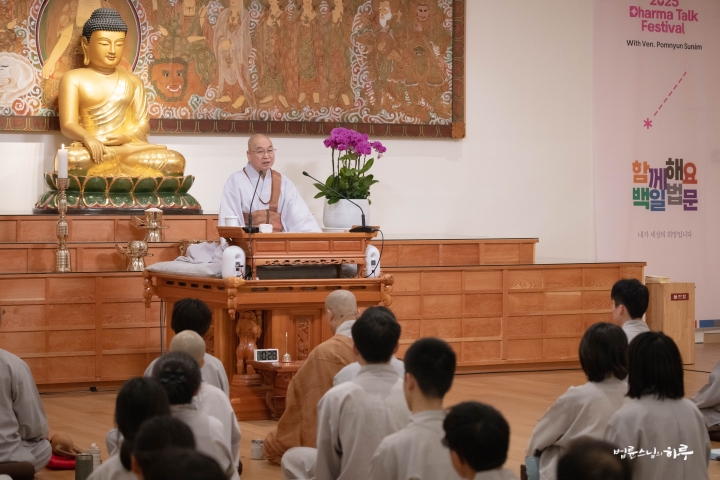
Therefore, it’s good to balance tranquility and strength. While maintaining mental equanimity, you should study scriptures and practice meditation. At the same time, you need to build basic physical strength and power through prostrations. Prostrations are essential for modern people who lack exercise. By strengthening your body and building power through prostrations, you can reduce the tendency to overthink or become too theoretical.
Basically, it’s good to do at least 108 prostrations daily and about 500 on weekends. This helps strengthen your physical condition and builds some power. Since Jungto Society engages in various social action activities, you need to step forward fearlessly when undertaking any task. Whether farming, distributing promotional materials on the street, or fundraising—all these activities require strength and courage.
To address various social problems in the future, you must be willing to face conflicts with others. If you only meditate and pray for blessings, you’ll be too afraid to act when confronted with real challenges. You might be good at practicing alone but unable to speak a single word in front of people. While practitioners shouldn’t show off in public, they also shouldn’t be unable to express their thoughts. You must clearly state your position and know how to overcome difficulties together with others to spread the Buddha’s teachings in society.
Of course, you shouldn’t overemphasize strength. The Buddha prohibited the use of supernatural powers. While the world values the power of money, authority, and violence, Buddhism pursues non-violence. Violence is not only about physical force; the improper use of wealth or power is also a form of violence. That’s why it’s essential for us to experience overcoming difficulties through practicing together. With this perspective in mind, let’s begin our practice now.”
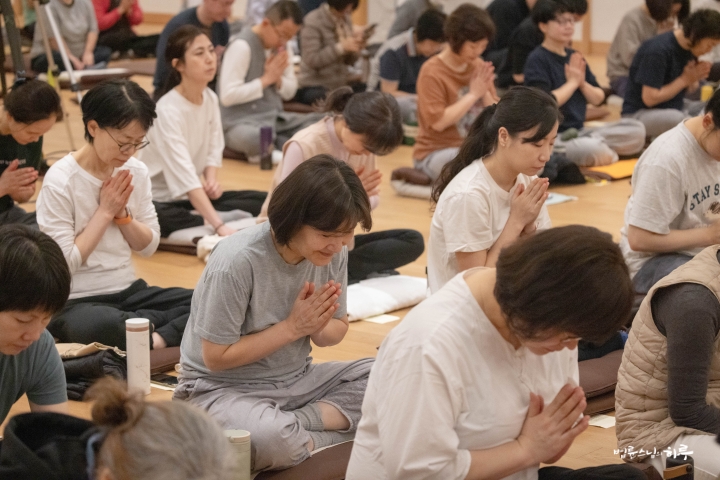
Next, Sunim began the 1080 prostration practice.
“Avalokitesvara Bodhisattva, Avalokitesvara Bodhisattva, Avalokitesvara Bodhisattva……”
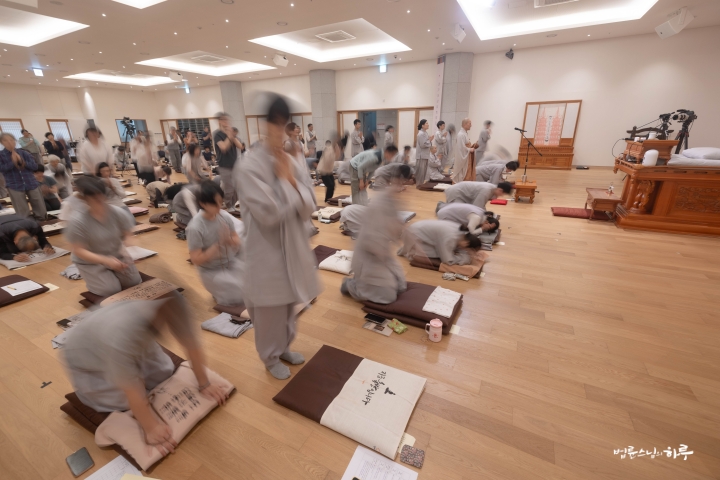
Everyone chanted loudly in rhythm with the wooden moktak instrument while performing prostrations. With each bead of the prayer beads that moved, beads of sweat formed on their foreheads.
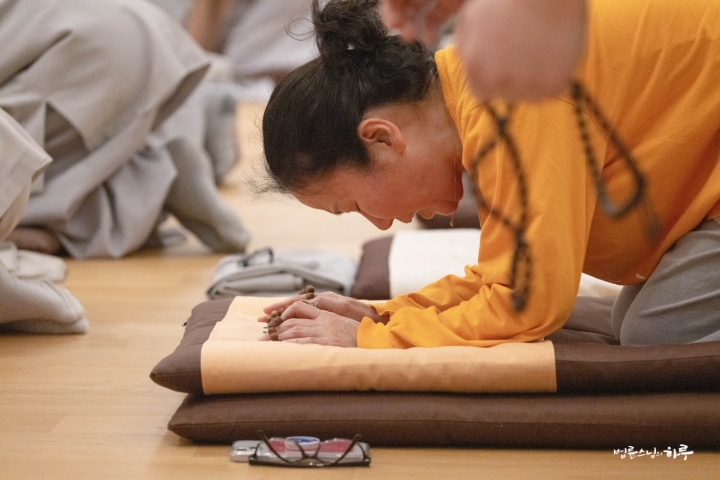
Amid the continuous sound of the moktak, it took three hours to complete all 1080 prostrations. With bodies drenched in sweat, the practice concluded with the Four Great Vows.
“May you attain enlightenment.”
After lunch, a person who developed sustainable water purifiers visited Sunim to explain about purifiers that could be supplied to areas with unclean drinking water. Park Gina, the JTS representative, took these purifiers to earthquake-affected areas in Myanmar.
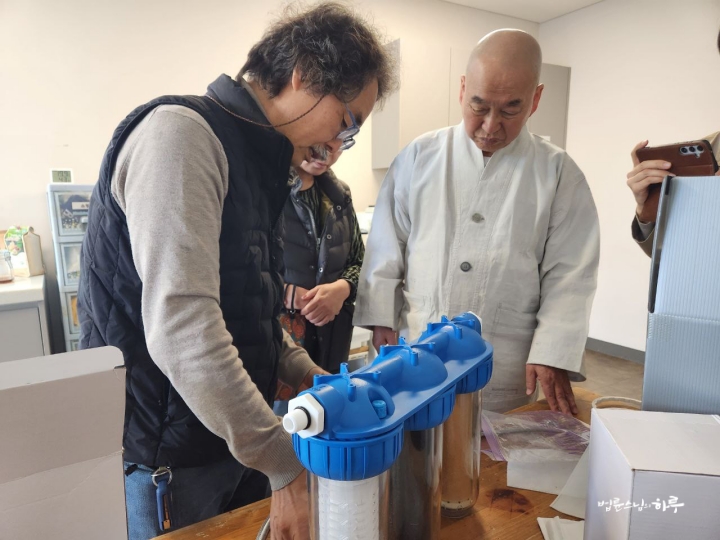
Usually, filters need to be regularly replaced and discarded, but this purifier was an eco-friendly system that could be used indefinitely by alternating between two filters, eliminating the need for new ones. After a certain period, the used filter could be soaked in salt water of a specific concentration for about an hour before reusing, while the other filter could be reused after burning its contents in a hot pan.
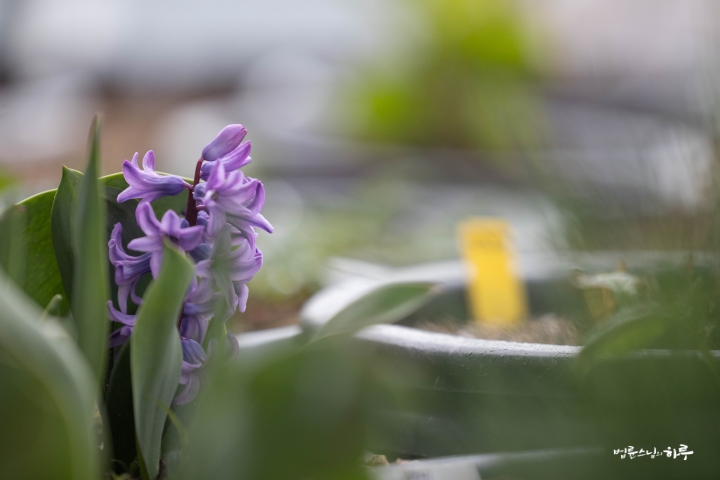
Today was the day for a lecture by Venerable Pomnyun Sunim, invited by “Gilbeot,” a gathering of broadcasting, film, theater, and art professionals. Starting at 1 PM, actors began arriving one after another.
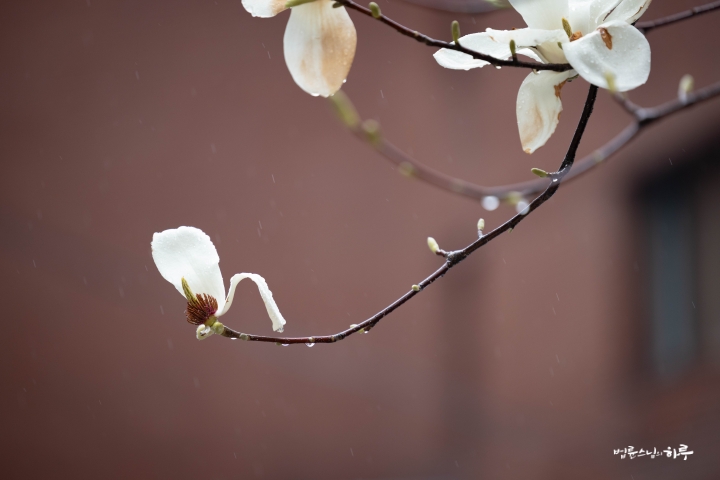
Before the lecture, everyone gathered for tea. Sunim first greeted writer Noh Hee-kyung warmly.
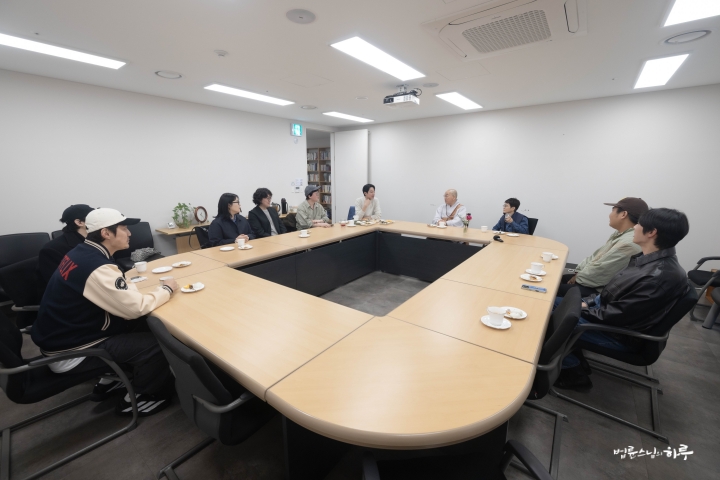
“Nice to see you. How have you been?”
“I’ve finished the first draft of my work. The production team is currently busy filming the drama.”
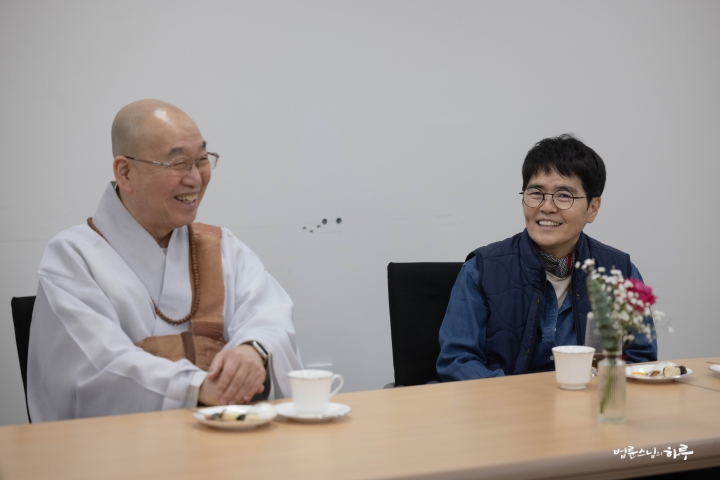
The actors introduced themselves and the dramas and movies they had appeared in before greeting Sunim. Sunim asked about the current state of the film and drama industry.
“Last year, I heard that the number of film and drama productions was decreasing, making the industry quite difficult. How is it this year?”
The actors and production company representatives unanimously replied that the situation continues to worsen.
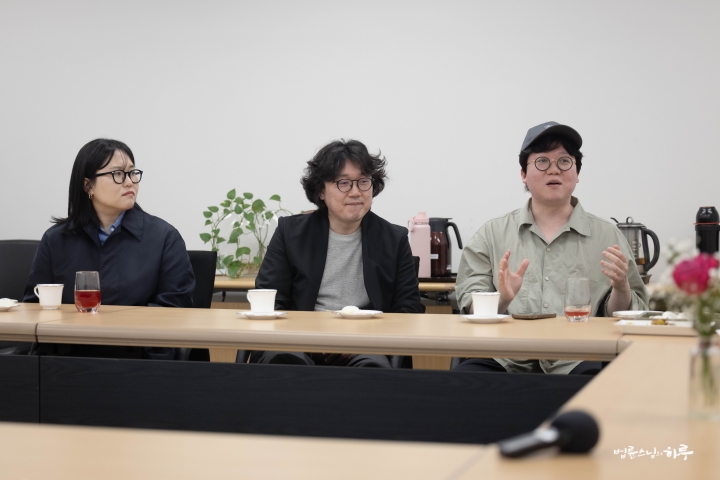
“The trend of decreasing productions continues. Currently, the Netflix market is saturated. As a result, industry professionals have nowhere to go due to lack of work. There’s talk about HBO entering the Korean market, but people are saying that the Chinese market needs to open up for there to be any real outlet.”
“Even if we don’t get cast, we should at least have many audition opportunities, but since those opportunities themselves have decreased significantly, everyone is struggling. Actors have fewer chances to perform, and production staff have less work.”
Since an actor from “Squid Game” was present, Sunim mentioned his brief memory of watching the show.
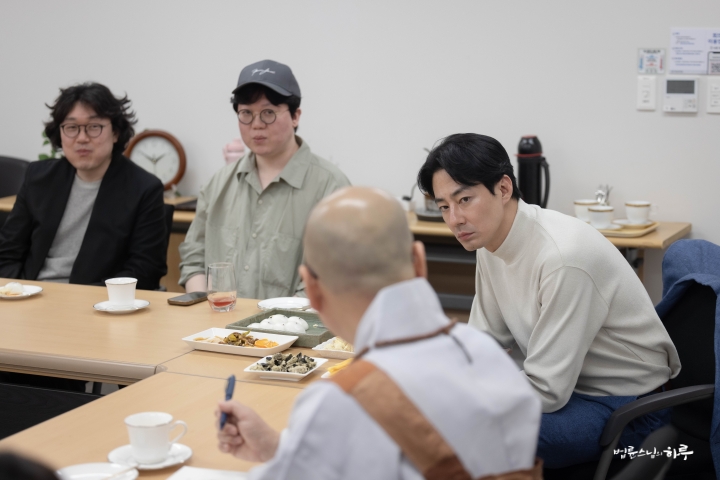
“When I was young, if someone broke the rules during a game, we would say ‘You’re dead.’ But when I watched Squid Game, they actually killed people.”
As the conversation continued, it was soon time to begin the lecture. Sunim moved to the underground auditorium with the actors.
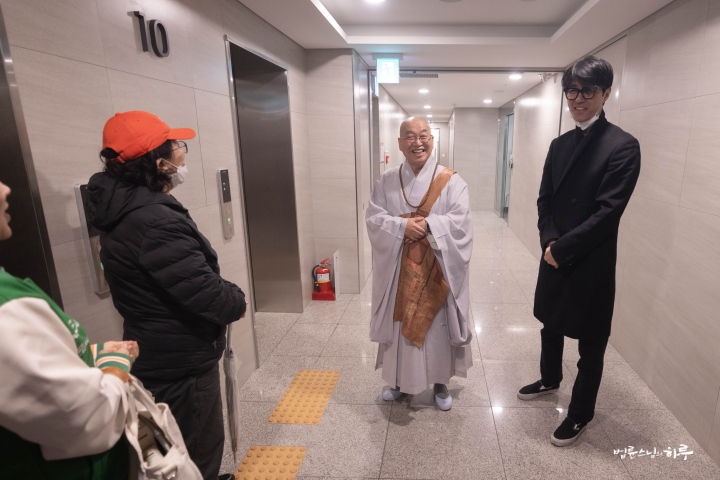
With 240 people filling the venue, actress Im Se-mi, who was hosting the event, introduced the purpose of today’s lecture.
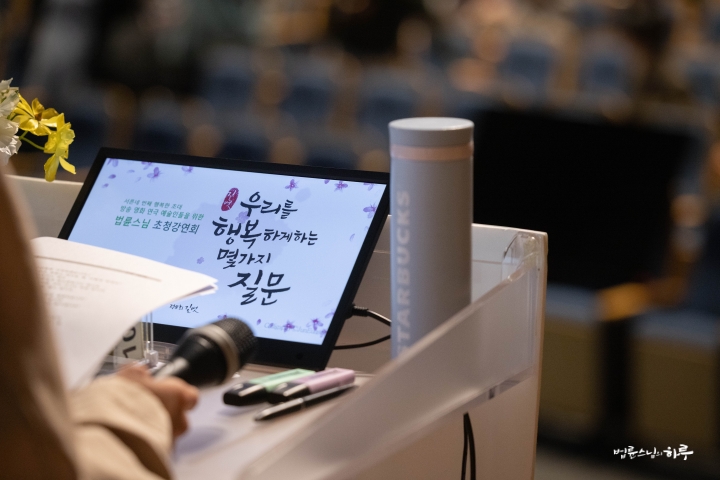
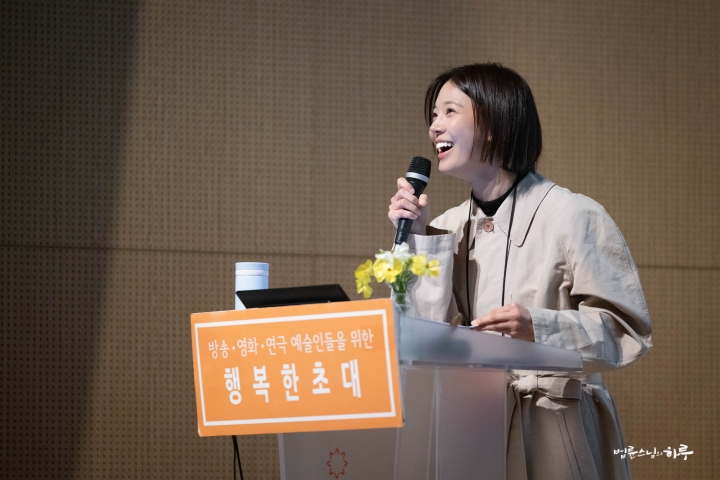
Is There a Way to Live Happily Without Worry?
“How many times do you worry each day? There are writers who worry about writer’s block, low ratings, and whether they should quit writing. There are actors who worry about messing up their performances, trying to please directors, not getting cast, and whether they should give up acting. There are staff members who worry about missing schedules, interpersonal relationships, and whether they should quit their jobs due to stress. There’s a saying, ‘If worrying eliminated worries, we’d have no worries.’ Is there really no way to live happily without worry? I hope we can find that path in Venerable Pomnyun Sunim’s lecture today.”
Next, writer Noh Hee-kyung, who serves as the representative of Gilbeot, gave her opening remarks.
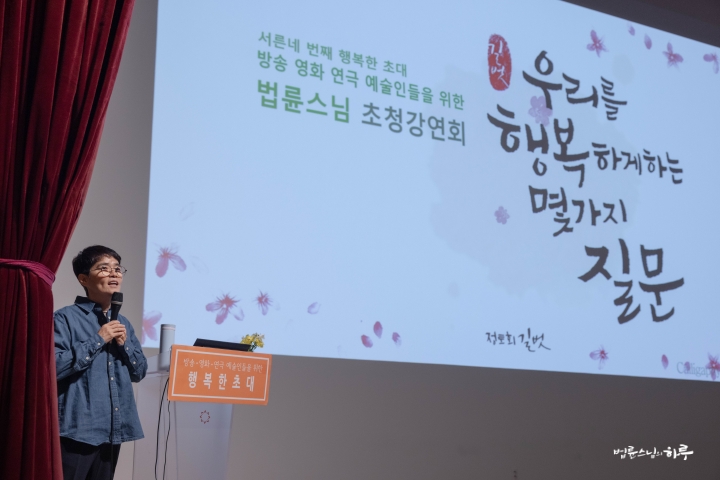
“I am Noh Hee-kyung, the representative of Gilbeot. I remember gaining a great insight from Sunim’s Dharma talk when I first established Gilbeot. Sunim asked:
‘There is a cave that has been dark for a thousand years. Not one year, not a hundred years, but a thousand years. How do you remove that darkness?’
I thought, ‘That must be really frustrating. How can such long-standing darkness be eliminated?’ But Sunim said, ‘Light a single candle. Then the thousand years of darkness will disappear in an instant.’ I was shocked by those words. I had thought that it would take a long time for darkness to disappear. A negative thought came to mind: ‘Doesn’t a candle go out instantly when you blow on it?’ But Sunim replied, ‘Then you light it again.’ Hearing those words, I realized that I had become accustomed to negative thinking.
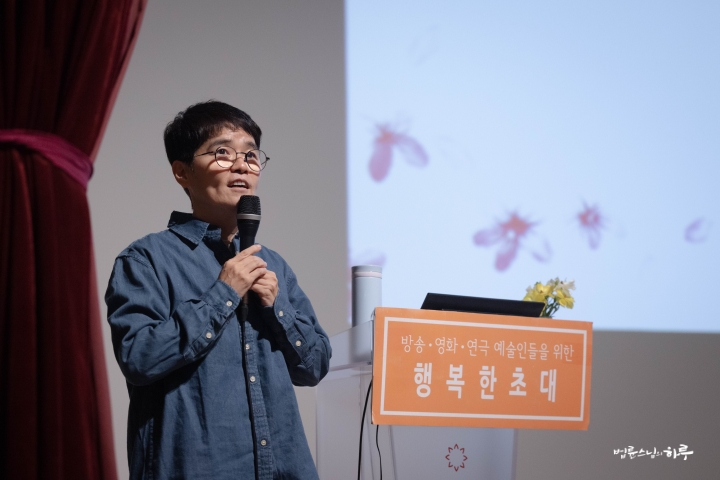
May This Be a Time to Gain the Strength to Light a Candle
Among those of you here today, some might feel trapped in a long tunnel, and others might think they’ve been trapped in a cave for three years, if not a thousand. I hope that from today’s gathering, you will gain ‘the strength to light a candle’ and ‘the strength to relight it if it goes out.'”
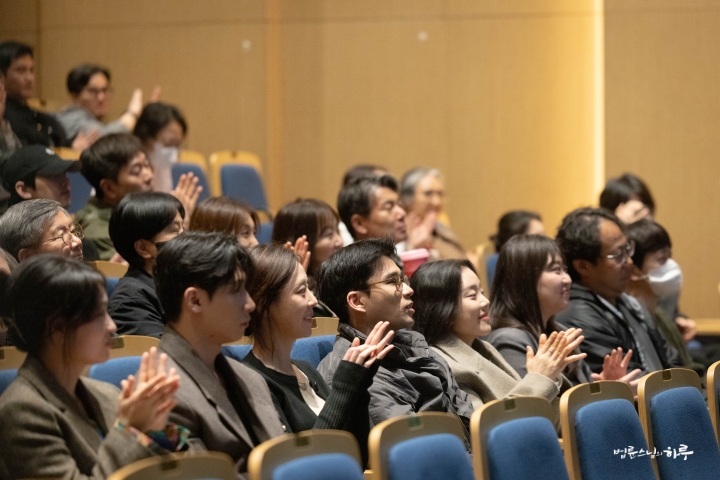
Next, everyone watched a video showing Sunim completing the construction of ten indigenous and special needs schools in Mindanao, Philippines, last December.
When the video ended, Sunim took the stage amid applause. After introducing the activities that JTS is conducting around the world, he began the conversation by asking the Gilbeot members to take more interest and participate.
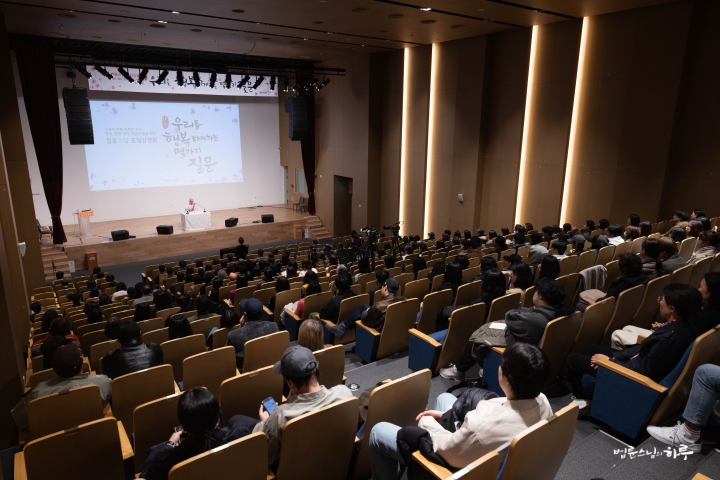
“JTS is an international relief organization established to eradicate hunger, disease, and illiteracy. In English, it stands for ‘Join Together Society.’ It embodies the meaning of ‘creating a world by participating together.’ It started with the spirit of working together rather than providing one-sided support. Regardless of who the recipients are—regardless of race, nationality, religion, or gender—we operate on the principle that if someone is hungry, they must eat; if they are sick, they must receive treatment; and children must learn at the appropriate time.
A 30-Year Journey to Eradicate Hunger, Disease, and Illiteracy
We have been continuing our activities for nearly 30 years. We started by establishing a school for untouchable children in India, and as tuberculosis cases increased, we built a small clinic. Gradually, our activities expanded to include village development. Now we support various countries across Asia, with stable support continuing for over 30 years in India and over 20 years in the Philippines.
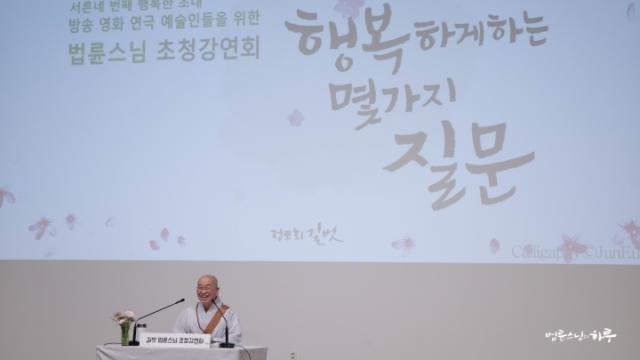
In the Philippines, particularly, we are establishing schools in indigenous mountain villages and conflict areas in Mindanao. In the past, it was difficult to build even two or three schools a year, but now we have developed enough expertise to build more than ten schools annually. While we have mainly built schools in remote areas, recently there has been an increasing interest in education in these regions, with many requests to build special schools for children with disabilities, which now account for about half of our total support.
In addition, we continue to provide support to disaster areas such as the earthquake in Syria, floods in Pakistan, and civil war in Myanmar. Currently, it is very difficult to provide aid to earthquake-affected areas in Myanmar due to civil war, but we have been helping refugees at the Thai border and providing support to Rohingya refugees who have crossed into Bangladesh. Writer Noh Hee-kyung and actor Jo In-sung have visited the Rohingya refugee camp together, and Han Ji-min has participated as a one-day teacher at an indigenous school in the mountains of Mindanao. The Gilbeot group collaborates with JTS annually for street fundraising and coal briquette delivery volunteer work, and they also visit overseas project sites together to help with promotional activities.
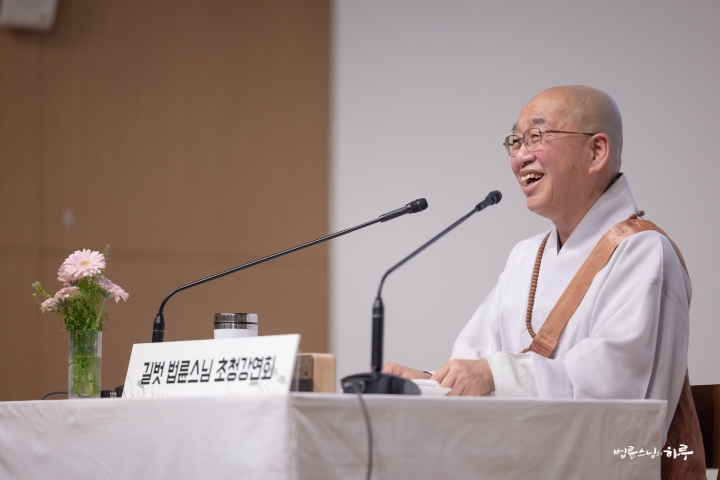
Creating a Model for a Happy Life with Less Consumption
JTS has primarily supported children and patients, but recently, in response to the climate crisis, we’ve begun sustainable regional development in Bhutan with the goal of ‘creating a model for a happy life with less consumption.’ Although Bhutan is a poor country, it has a high happiness index. JTS is currently conducting sustainable development projects in two of the most disadvantaged provinces. We’re building houses for the homeless and supporting interior repairs such as kitchens and bathrooms for families with poor living conditions. In villages, we’re constructing irrigation channels, installing fences to protect crops from animals, and partially paving steep or creek-crossing dirt roads with cement to improve residents’ convenience. We’re also improving school facilities. Additionally, we’re preparing various projects to enhance residents’ daily lives, such as providing cataract surgery for elderly people with poor eyesight, hearing aids for those with hearing difficulties, and dentures for those who have lost their teeth. I hope all of you, our Dharma friends, will take interest and participate in these efforts.”
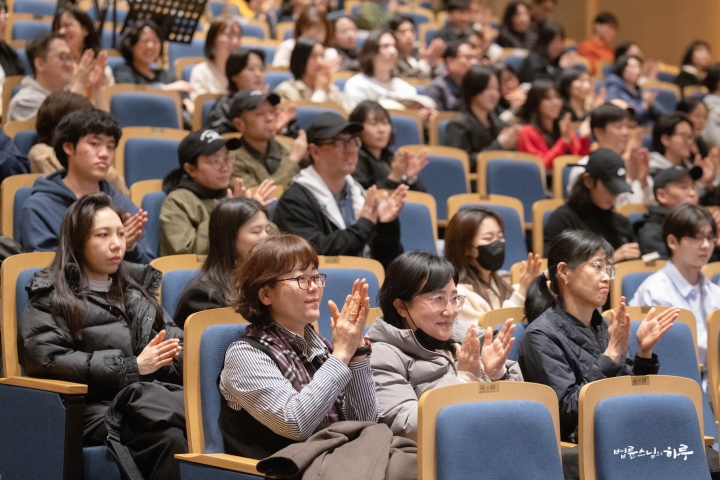
Following this, nine people raised their hands to engage in conversation with Sunim. Those who had submitted questions in advance were given priority, followed by spontaneous questions from the audience. One person sought Sunim’s advice on how to find balance between pursuing his dream of becoming an actor and addressing his financial concerns.
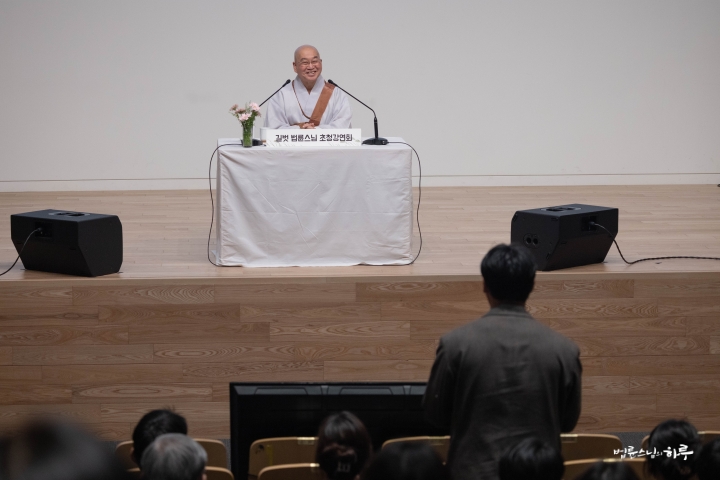
How Can I Find Balance Between My Dream of Becoming an Actor and Making a Living?
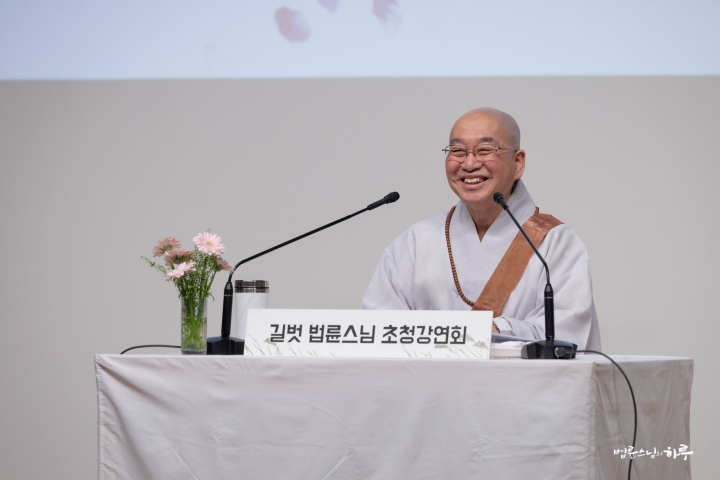
“Are you an aspiring actor or are you already an actor?”
“I’ve already made my debut, though it’s been a while since my last production.”
“Then you’ve already achieved your dream of becoming an actor. When you say you ‘want to achieve your dream of becoming an actor,’ do you actually mean you want to become more famous than you are now?”
“Yes, I want to become more well-known.”
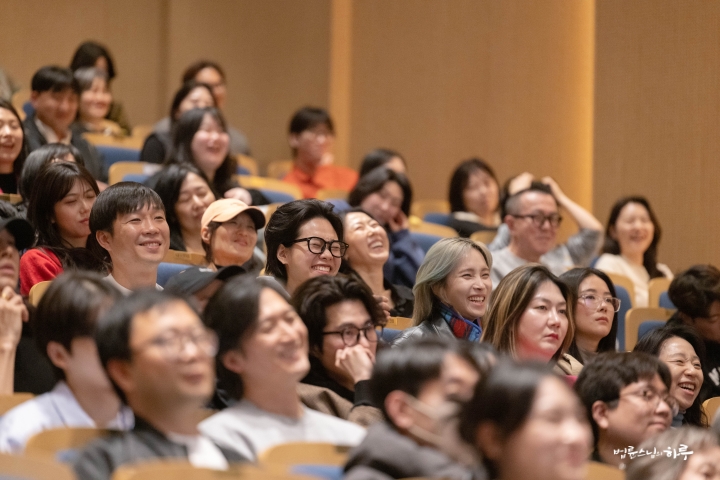
“You’ve already achieved your dream of becoming an actor, and now your goal is to become famous. For example, if my dream was to open a store and I actually opened one, then I’ve already achieved that dream. But if I want to grow that store, I need to put in the effort accordingly. You mentioned that you’re confused between your dream as an actor and your job for livelihood, but I see it differently. If you hadn’t debuted as an actor, you might worry that you couldn’t practice properly because of making a living, leading to failure in debuting. But you’ve already debuted as an actor. Your current concern is ‘how can I become more famous?’ However, just because everyone wants to be famous doesn’t mean everyone can be. This is especially true in the acting profession. The competition is extremely high from the bottom to becoming a famous actor.
In regular companies or public service, promotions generally have a certain timeframe and competition ratio. Although promotions aren’t easy, they typically have a 4:1 or 8:1 competition ratio within a certain period. But professions that require building public recognition, like entertainers, are different. The process of becoming famous isn’t consistent, and the path is very narrow and uncertain. In some cases, you need to overcome competition ratios of more than 100:1. The variance is that significant. If it’s been several years since you debuted, shouldn’t we consider that the opportunity to become explosively famous in a short time has already passed? Of course, people with exceptionally outstanding talent can gain fame through explosive public response as soon as they’re cast. But we should consider that you’ve already passed that stage.
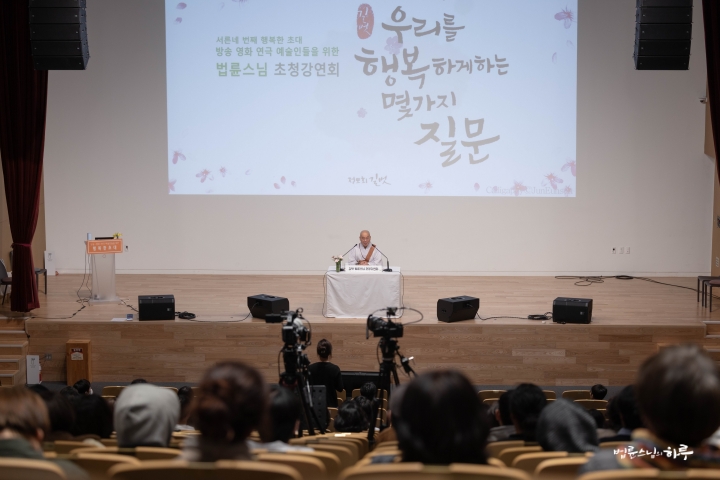
So what remains to be done? You need to practice consistently while waiting for opportunities. For actors, skill is important, but results can vary greatly depending on which production you’re cast in. You might appear as a supporting actor in a successful film, get noticed for your performance, and become famous as a result. However, this doesn’t happen through effort alone—it requires opportunity, which is beyond your control. All you can do is prepare consistently through practice for when that moment comes. If your goal is “becoming famous,” you need to ask yourself if you’re prepared to give up all work related to making a living. I ask because you seem to prefer a stable lifestyle.
You have two paths to choose from. First, you could fully commit to acting even if it means living in poverty until you become famous. You would approach it like buying a lottery ticket—continuing to try even if it doesn’t work out, living on ramen if necessary. When opportunities arise, you would act anywhere, taking supporting or minor roles even without pay, just to gain diverse acting experience. This path involves waiting for that one moment when you receive significant recognition.
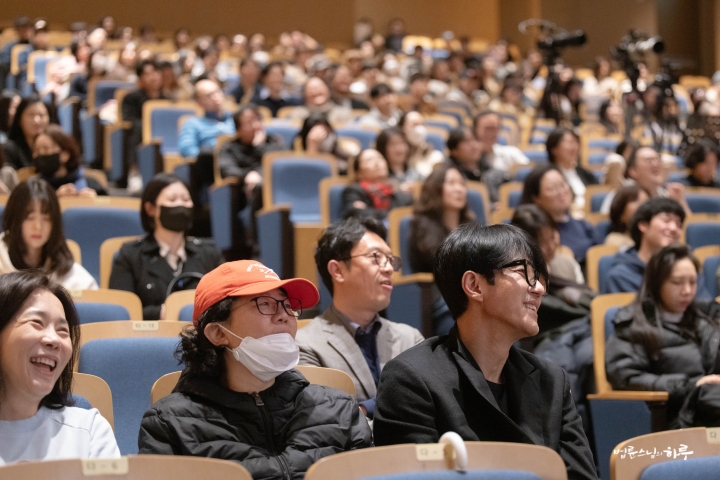
Second, try treating acting as a side job rather than your main career. You should consider that you’ve already achieved your dream of becoming an actor. But since you can’t make a living from it alone, you continue working at your regular job while remaining registered as an actor. You go when you get a call, and it’s fine if you don’t. It’s about taking a more relaxed approach to the acting profession. There are many amateurs who sing and act well, right? Similarly, you could maintain your main job for livelihood while doing acting part-time. No one knows what will happen in life. Someday, a good opportunity might come along, and acting could become your main profession again.
Taking a job to support yourself doesn’t mean giving up on acting. Working at a company, doing day labor, or trying cleaning jobs—all these experiences can help you as an actor. Just as writers use such experiences as material for their writing, actors can use them as practice for when they take on similar roles later. It’s like getting advance experience for potential future roles. Try thinking of it as “This is acting practice” while experiencing various occupations. Go to rural areas and try farming, do whatever work comes your way as acting practice. Rather than thinking, “I’m an actor, should I really be focusing only on making a living?” try to see it as “This is practice for when I take on such a role in the future.” Wouldn’t real-life experience help develop your acting skills much more than practicing alone in your room?
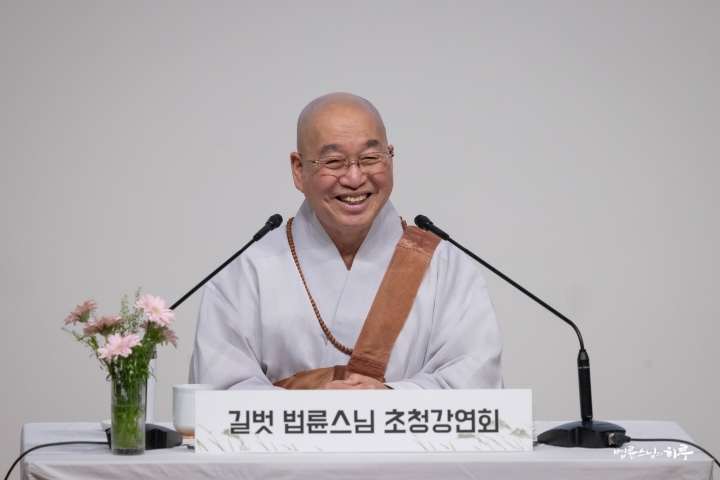
I dropped out of high school and didn’t continue with formal education after that. But when you talk with me, I’m not completely ignorant, right? That’s because I study what I actually need. Instead of studying things I might never use, I focus on immediately useful knowledge, which makes me very strong in practical situations. When you study something because you genuinely need it, it usually stays in your memory for a long time. On the other hand, if you study something you don’t feel is necessary, you can memorize 100 items and barely remember any of them. The studying you do for school exams is essentially disposable. Since the goal is just to do well on the test, once the exam is over, you forget everything as if throwing it in the trash. That’s why when I ask college graduates about science or history, few know much. Sometimes I ask, “How did you even graduate from university?” They respond, “Sunim, how could I remember something I learned so long ago?” The reason most people can’t remember even high school-level questions is that their studies weren’t connected to their actual lives. I never studied just to pass exams. I always study what’s essential in real situations, so I do a lot of research on my own. That’s why it stays in my memory for a long time.
Acting is the same way. You don’t have to be on stage to practice acting. Try to adopt the perspective that ‘daily life itself is acting practice.’ Do your own cleaning, do everything yourself. This way, you get acting practice and earn money too—it’s a win-win. Don’t think of becoming a more famous actor as your dream. If I were an actor, I would approach every profession in the world as if I had become that person. I would consider it all acting practice. This reduces the pressure to become famous as an actor and makes your life lighter. Instead of just chasing after big breaks, why not try viewing your life as both being an actor and having a profession at the same time?”
“Yes. Thank you for your valuable advice.”
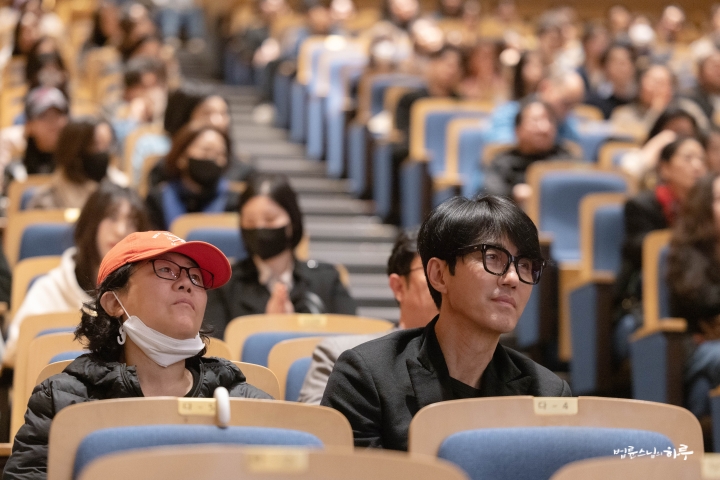
The questions continued to flow. Today, there were many questions from actors. As Sunim engaged in conversations about various concerns, two hours passed quickly. The participants’ hearts became brighter and lighter.
The lecture ended with enthusiastic applause. Through a drawing, some participants received books with Sunim’s personal signature. Each time a name was called, everyone cheered as the person came forward to receive their gift.
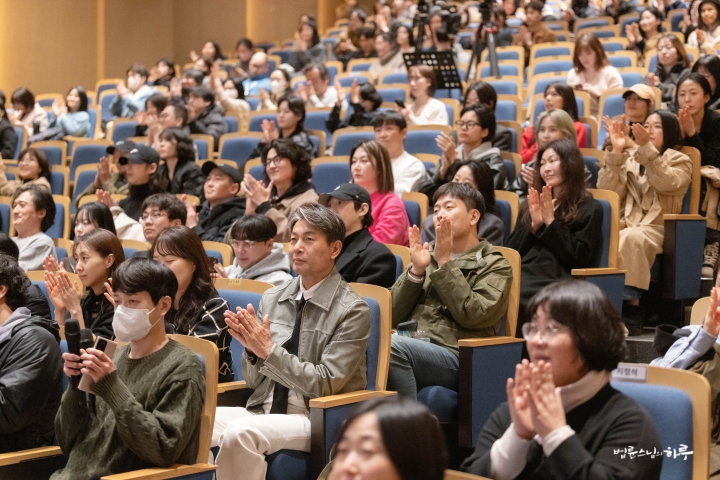
Sunim and writer Noh Hee-kyung stood in front of the stage and greeted each participant with a bow and words of gratitude as they exited the lecture hall.
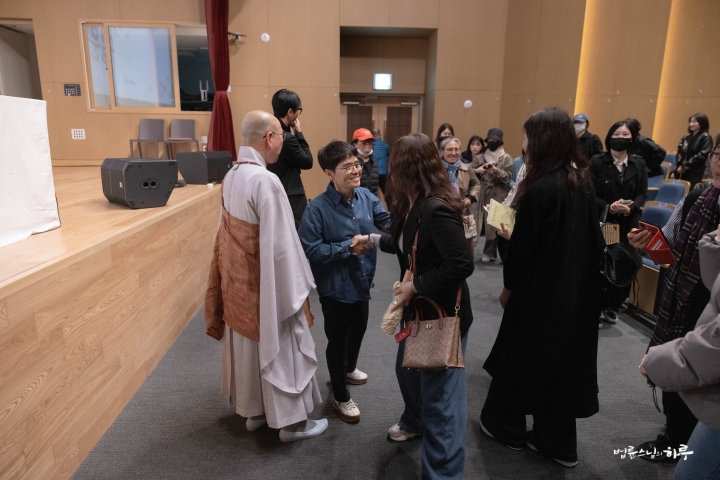
“Thank you for coming. Be happy!”
After all participants had left, the volunteers who prepared the lecture gathered with Sunim for a commemorative photo.
“Gilbut, fighting!”
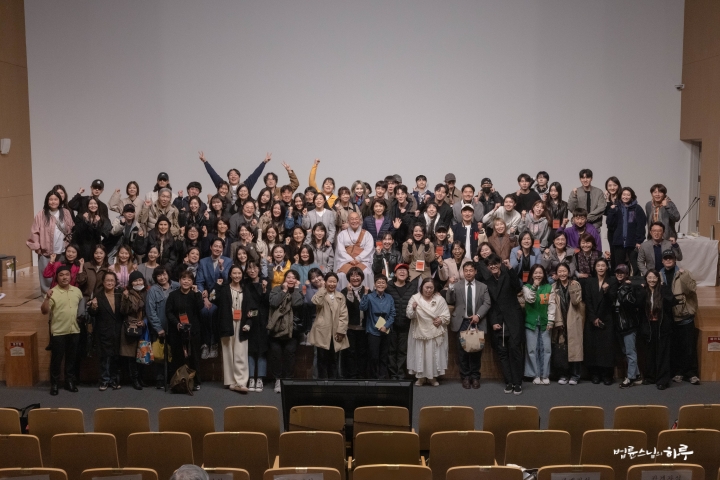
With this, the thirty-fourth Gilbut lecture came to an end.
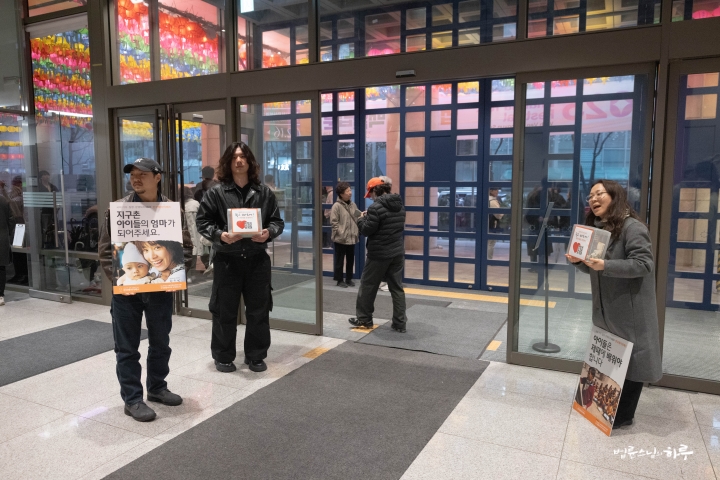
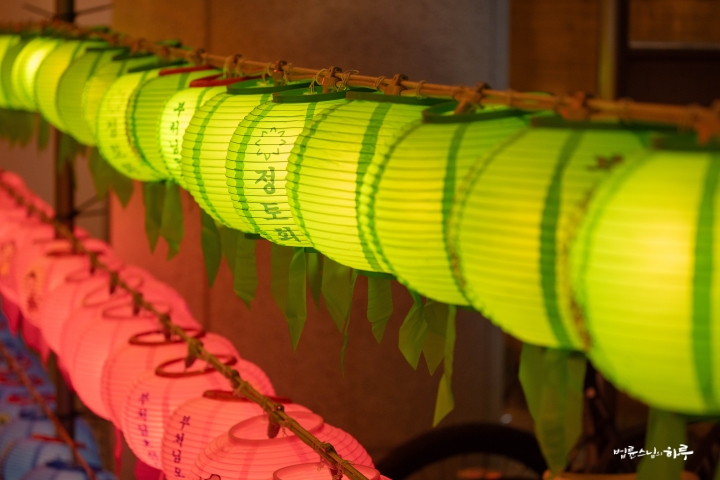
Tomorrow will be the 49th day of the 100-Day Dharma Talk. In the morning, Sunim will meditate with the Sangha at the Jungto Social and Cultural Center, and in the afternoon, he will participate online in the Happiness Movement Special Division leadership training to discuss questions that arise during their activities.




